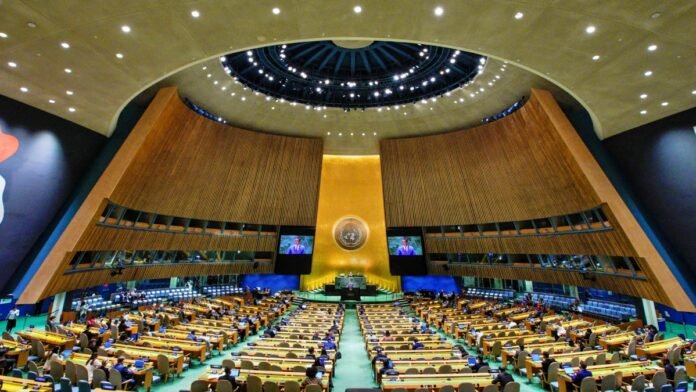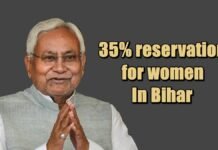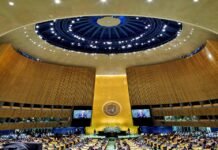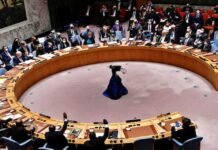
New Delhi: Amidst the escalating violence between Israel and Palestine, India has taken a decisive stand in the United Nations General Assembly (UNGA) and has expressed its desire for peace and stability in the region. India voted in favor of a draft resolution in the UNGA that called for an immediate humanitarian ceasefire in the Israel-Hamas conflict and the unconditional release of all hostages. The resolution also urged all parties to respect international law and protect civilians.
Background of the conflict
The conflict in Gaza erupted on October 7, 2023, when Hamas, the Islamist militant group that controls the Gaza Strip, launched a barrage of rockets at Israel, in response to what it claimed were Israeli provocations at the Al-Aqsa Mosque compound in Jerusalem, a holy site for both Muslims and Jews. Israel retaliated with airstrikes and ground operations, targeting Hamas’s military infrastructure and leaders. The fighting has resulted in thousands of casualties, mostly civilians, and widespread destruction of homes, schools, hospitals, and other infrastructure in Gaza. The international community has expressed alarm over the humanitarian crisis and the risk of further escalation.
The UNGA resolution
On December 12, 2023, an emergency special session of the 193-member UNGA was convened to address the situation in Gaza. The session was requested by Egypt, which has been mediating between Israel and Hamas to broker a ceasefire. The UNGA adopted a resolution, sponsored by Algeria, Bahrain, Iraq, Kuwait, Oman, Qatar, Saudi Arabia, the United Arab Emirates, and Palestine, that demanded an immediate humanitarian ceasefire in Gaza and the immediate and unconditional release of all hostages. The resolution also called for ensuring humanitarian access, facilitating the delivery of aid and assistance, and supporting the efforts of the UN and other regional and international actors to restore calm and resume dialogue.
The resolution was adopted by a vote of 153 in favor, 10 against, and 23 abstentions. India was among the countries that voted in favor of the resolution, along with other major powers such as China, Russia, France, Germany, Japan, and Brazil. The countries that voted against the resolution were Israel, the United States, Canada, Australia, New Zealand, Micronesia, the Marshall Islands, Nauru, Palau, and Tuvalu. The countries that abstained included the United Kingdom, Spain, Italy, Norway, Switzerland, Mexico, Colombia, Chile, Argentina, and South Africa.
India’s position
India’s Permanent Representative to the UN, Ruchira Kamboj, explained India’s vote and reiterated India’s support for a peaceful and lasting two-state solution to the Israeli-Palestinian conflict. She said that India condemned the Hamas attack on Israel as a terrorist act and expressed concern over the hostage situation. She also said that India was deeply disturbed by the humanitarian crisis and the civilian casualties in Gaza, especially women and children. She stressed that India expected all parties to comply with international humanitarian law and respect the dignity and rights of the people.
She further said that India welcomed the unity of the international community in addressing the challenges facing the region. She said that India’s challenge in these exceptionally difficult times was to strike the right balance between its traditional friendship with Palestine and its growing ties with Israel. She said that India hoped that the UNGA resolution would pave the way for a cessation of hostilities and a resumption of dialogue. She said that India remained committed to the vision of two states, Israel and Palestine, living side by side in peace and security, within mutually agreed borders.
International reactions
The UNGA resolution was welcomed by the UN Secretary-General, Antonio Guterres, who said that it sent a clear message to the parties to end the violence and resume negotiations. He said that he would continue to work with all stakeholders to achieve a durable ceasefire and a political solution. He also appealed for urgent humanitarian assistance and support for the reconstruction of Gaza.
The resolution was also welcomed by Egypt, which said that it reflected the will of the international community to end the bloodshed and suffering in Gaza. Egypt said that it would continue its efforts to mediate a ceasefire and facilitate the delivery of humanitarian aid. Egypt also called for the revival of the peace process and the implementation of the relevant UN resolutions.
The resolution was rejected by Israel, which said that it was biased and one-sided and ignored the Hamas aggression and the Israeli right to self-defense. Israel said that it would not abide by the resolution and would continue to defend its citizens and sovereignty. Israel also accused the UNGA of being a rubber stamp for the anti-Israel agenda of some countries and groups.
The resolution was also criticized by the United States, which said that it was unbalanced and unhelpful and undermined the efforts to achieve a ceasefire and a diplomatic solution. The United States said that it would continue to work with its partners and allies to support Israel’s security and address the humanitarian needs of the people in Gaza. The United States also reaffirmed its commitment to the two-state solution and the resumption of direct negotiations between the parties.

Meanwhile, the resolution was followed by another round of rocket attacks by Hamas and airstrikes by Israel, indicating that the fighting was far from over. The UN, Egypt, and other mediators were still trying to broker a ceasefire and prevent further escalation. The international community was also preparing to mobilize humanitarian aid and support for the reconstruction of Gaza. The fate of the hostages and the prospects of the peace process remained uncertain.













































